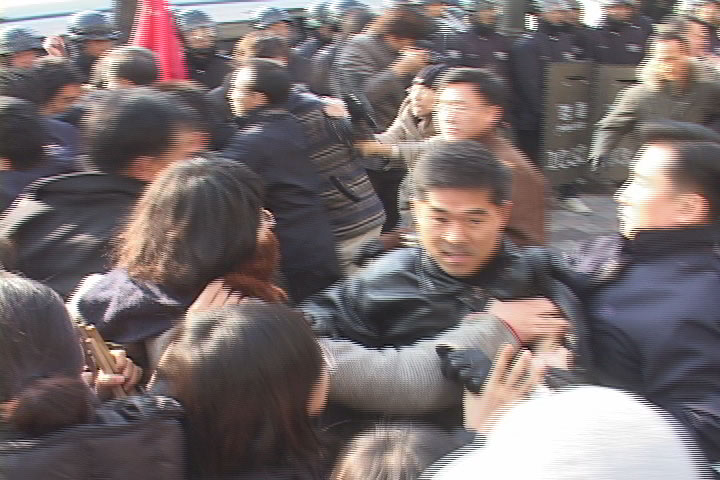Repression Against Migrant Workers Union in South Korea
KCTU/ETU-MB | 08.01.2004 04:13 | Social Struggles | World

Immigration police in action against migrant workers
Seoul, Jan. 7 - South Korea's only migrant worker union had an unexpected showdown with immigration officers Wednesday outside the Bangladeshi Embassy in central Seoul, a source close to the Equality Trade Union-Migrants Branch (ETU-MB) said.
As about 60 migrant workers and their South Korean supporters, who have been holding a sit-in demonstration at downtown Seoul church for almost two months, were approaching the Bangladeshi Embassy for a demonstration, they sighted a group of immigration officers waiting in the nearby Hotel Capital, a source said on condition of anonymity.
After deciding to not to hold the demonstration and return to their sit-in struggle base, around 200 police surrounded the migrant workers enabling the over 40 immigration officers to pick off two of the illegal aliens, one Bangladeshi and one Nepali, said Kabir Uddin of the ETU-MB.
Roughly half an hour later the immigration officers left and the police dispersed, allowing the foreign workers to leave. Uddin said the immigration officers were sighting union leaders.
The ETU-MB unionists have been camped out in makeshift shelters at Myeongdong Cathedral for 54 days to call for an end to a government crackdown on undocumented foreign workers, a stop to deportations and the legalization of all migrant workers in the country.
Myeongdong Cathedral has historically been a refuge for labor, political and civic activists, as the police have not usually entered the compound.
"The immigration authorities and the police are obviously working in cahoots with the embassy," an anonymous source close the union said.
The foreign workers, from Bangladesh, Nepal, Malaysia, the Philippines and a number other countries, were heading to the Bangladeshi Embassy to protest the treatment of two of ETU-MB's members who had recently been deported from South Korea.
After sitting in detention for over two months since their apprehension by South Korean authorities during a labor demonstration on Oct. 26, Jamal Ali and Mohammed Bidduth were deported on Dec. 30. That morning, they were taken to Incheon International Airport by 10 immigration officers, who were then joined by 20 more officers at the airport to accompany them to the airplane, Bidduth said in a letter to the ETU-MB.
Four officers flew with them to Bangladesh, where upon arrival they turned the two men over to Bangladeshi immigration authorities, who passed them on several hours later into police custody, he said.
Bidduth claimed the four South Korean immigration officers that handed him over said he was a terrorist and gave the wrong information to the Bangladeshi immigration authorities.
Following several days in jail, the two are now free on bail, ETU-MB officials said.
The deportations came a day before the government announced that a grace period of two weeks ending Jan. 15 would be given to induce approximately 100,000 illegal aliens to voluntarily leave the country.
Under the terms of the grace period, those that do depart the nation would be able to return six months later via certain government-instituted programs, provided they were not in the country more than four years already.
This new grace period follows one in the first two weeks of November. South Korea had originally given illegal foreign workers who had been in South Korea less than four years until Oct. 31 to register with the authorities or voluntarily exit the country.
All those here four years or longer had to leave the country.
Since then the government has conducted two monthly 10-day intensive sweeps for illegal workers. The crackdown is to continue this year.
The grace periods, deadlines and crackdown are part of government measures to put into effect a new Employment Permit System (EPS) for procuring and managing migrant workers, mainly for so-called "3D" (dirty, dangerous and difficult) jobs at small- and medium-sized manufacturers.
The EPS, introduced in legislation passed mid-summer, was originally intended to replace the much-disdained, by both migrant workers and employers, Industrial Training System (ITS). They will now run alongside each other.
The demands of the ETU-MB sit-in struggle, begun Nov. 15, are for the abolishment of the ITS, the establishment of a five-year work permit system, the freedom to choose their place of work, the release of all migrant workers being held in detention centers, and the guarantee of the three basic labor rights stipulated by the South Korean Constitution: the rights of organization, collective bargaining and collective action.
As opposed to the ITS and the EPS what the ETU-MB is calling for is a five-year work permit system wherein migrant workers will be granted full labor rights, including the right to change employers, in accordance with stipulations for the treatment of migrant workers by the International Labor Organization and the United Nations, of which South Korea is a member.
The were approximately 120,000 remaining illegal migrant workers who did not or were not able to register with the authorities, and if deported, will have to be replaced by workers, who in four years' time will also become illegal when they exceed the time limit of the EPS, causing the government, migrant workers and Korean society to face the same problems they face today, according to the ETU-MB's chief, Samar Thapa of Nepal. The problems are cyclic, he has said.
The ETU-MB, formed in 2001, is the only nationwide migrant labor union in the world, and has been keeping the public informed of its activities through its website,
 http://migrant.nodong.net.
http://migrant.nodong.net. According to government figures, of the over 300,000 illegal aliens that were in the country when the figure peaked this year, some 27,000 have left and 184,000 have been legalized under the EPS legislation.
KCTU/ETU-MB
 e-mail:
migrant@jinbo.net
e-mail:
migrant@jinbo.net
 Homepage:
http://migrant.nodong.net
Homepage:
http://migrant.nodong.net
Comments
Display the following 2 comments